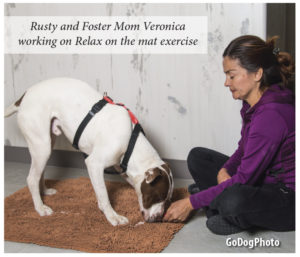
You can help a homeless dog or cat by opening your home and heart while her forever home turns up. It will involve some effort, commitment and time on your part; however the process can be eased by working with a reputable rescue group who will assist you with the appropriate preparation, integration, and consistent support during the fostering period. And the experience can be highly rewarding for you!
THINGS TO CONSIDER
Often, we have little, inaccurate or no information about the dogs or cats in rescue. It may be that the pet was surrendered due to financial hardship and is otherwise perfect, but it is also possible that the pet had behavior issues that the family did not want to deal with such as dog/dog reactivity, dog/people reactivity, destructive chewing, resource guarding, soiling, separation anxiety, barking, digging, etc… and when fostering a pet, you should be aware that they may exhibit behavior problems and be prepared to address these problems safely and humanely.
While fostering the pet you are helping prepare them to present well at adoption events, but most importantly to be a loving companion for a family. Many times you are teaching the dog how to do something for the first time, such as getting in a car, climbing stairs, crossing thresholds or even playing with a toy. The foster period can range from days to months and you should be prepared to deal with any unexpected challenges that may present such as an unexpected trip or a behavior problem. Most rescue groups have a limited amount of foster homes ready to take in pets and may not be able to take the pet back right away if you change your mind about fostering.
 INTERESTED IN FOSTERING?
INTERESTED IN FOSTERING?
The rescue group should meet with you to learn about your specific interest in the type of pet you wish to foster, such as puppy, senior, special needs, small, large or breed specific. They will also be interested in learning about your lifestyle, schedule and will evaluate your set up at home. They should know about your existing pets, their temperament, play styles and acceptance of another pet in the household. The rescue group should work to find a dog or cat that will be a good match for your family and will want to make sure everyone is on board with a consistent plan of care for the foster pup or kitty. They will also arrange for a meet and greet and will assist you with introducing the dog to your family of existing pets as well.
The rescue group should also work with you to develop an appropriate plan for socialization, integration into the family and should assist you with information on how and what social skills to teach your foster dog. They will have ideas for appropriate enrichment, exercise and effective use of space, barrier and crate training. Foster dogs should always be set up for success and everything should be taught using positive reinforcement. Important to note that foster parents should be aware of restrictions by landlord or homeowners association pertaining to pet limit, weight limit or breed discrimination. Also to check exclusions in homeowner’s insurance.
HOW TO PREPARE
By spending a little bit of time preparing for the arrival of your foster pet you can help create a less stressful and successful arrangement that will help your foster pet settle with ease into your home.
Your foster pet should live indoors with the family. They should not be left outside unsupervised and should not be allowed to run loose or go to the dog park. Scheduled playdates with friends you know and trust are typically a good idea and approved by most rescue groups.
When initially bringing a new pet home plan on using barriers, baby gates and crates to train your foster pet. This will help create safe and calm space for all of the animals in your family. If you do not have access to this equipment and cannot purchase it you can ask rescue group to help you obtain this.You should conduct a safety assessment of exterior and interior spaces such as unsafe fencing, toxic plants, pesticides, chemicals, cleaning products, furniture, electrical wires, valuables that may be ruined, etc.
 WHAT DOES THE RESCUE GROUP PROVIDE?
WHAT DOES THE RESCUE GROUP PROVIDE?
Most rescue groups will pay all expenses including veterinary care, food and behavior assessments and training, equipment and other supplies. You may choose to help pay for some of this if your pocketbook allows. Your foster pet should be be spayed/neutered, immunized and microchipped.
The rescue group should be committed to helping the foster pet integrate comfortably into your home and should offer support along the way. They should also be willing to take the pet back if significant unforeseen problems arise and should be marketing the pet for adoption through social networks and/or adoption events.
GET INVOLVED NOW
Please partner with a reputable rescue group to help save the life of a needy animal in our community. With your support another life can be saved!
Veronica Selco – MS, KPA CTP, AMCP, CNWI
Co-founder Hearts Alive Village Las Vegas
www.HAVLV.com
